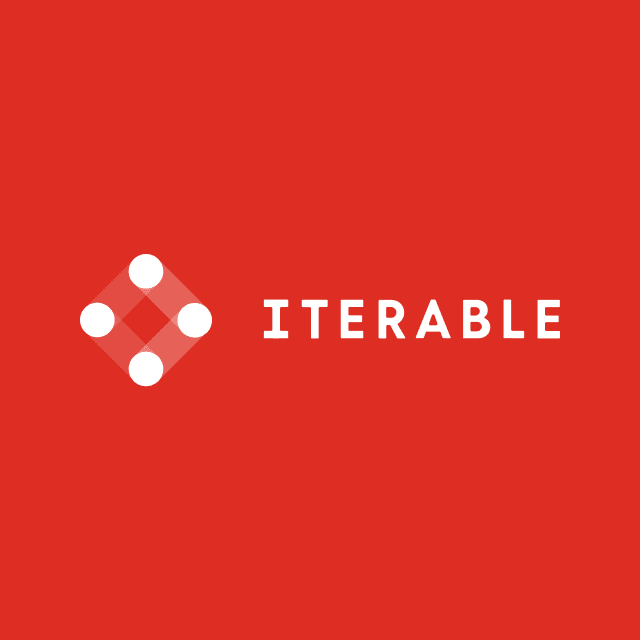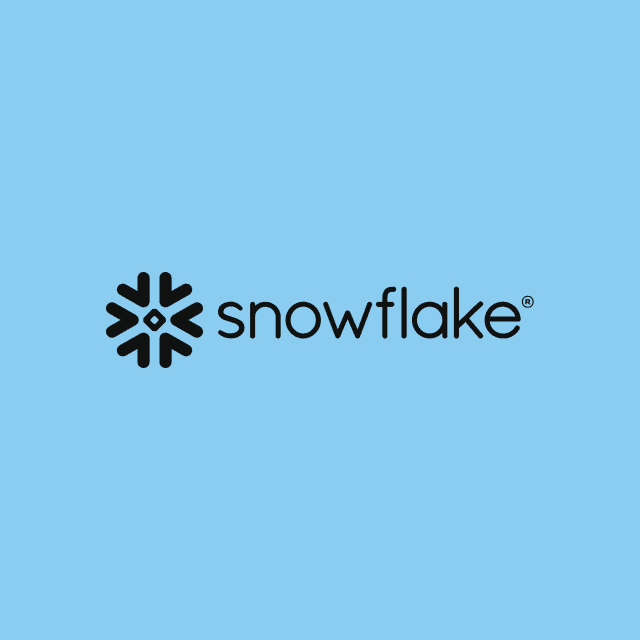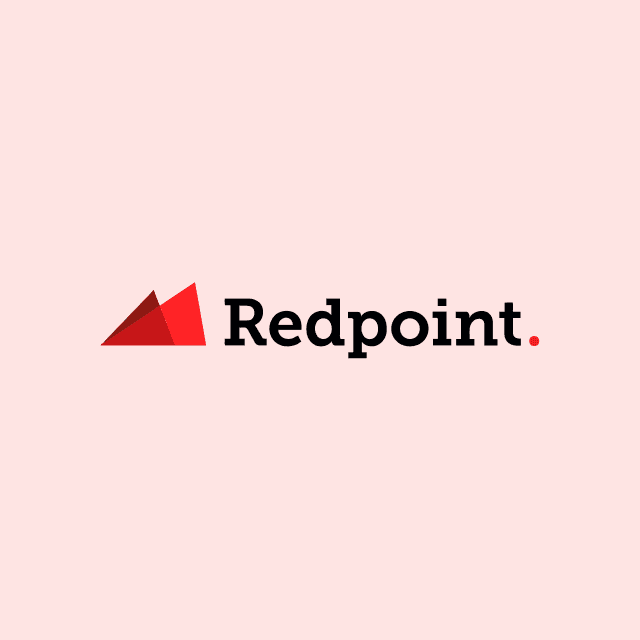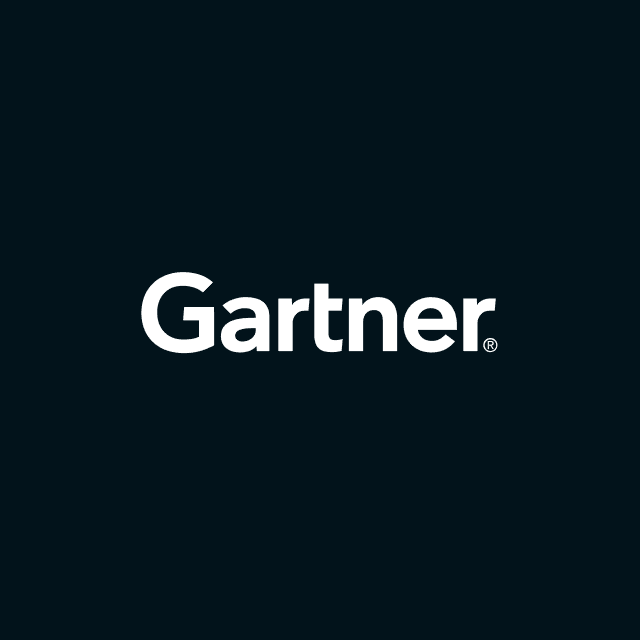Just start with suppression
Suppression audiences are a simple way to boost campaign effectiveness and reduce spend. So why aren’t more companies using them?
Andy Ramirez,
Alec Haase
May 23, 2023
|6 minutes

Imagine this: you stride into the offices of your CEO and CFO, excited to deliver the news that you've not only met your revenue goals but also achieved them while slashing marketing costs by a remarkable 30%. The mere thought of such an accomplishment could propel you towards a well-deserved promotion. It sounds like a far-out dream, yet, for marketing and advertising leaders, this triumph doesn't solely hinge on complex targeting and hyper-personalized campaigns – well, at least not initially.
One of the most fundamental skills that marketers and advertisers can master to increase their efficiency is suppressing specific customers from their campaigns. In this blog post, we'll explore the importance of audience suppression, why companies often struggle to fully embrace this crucial strategy, and, most importantly–how you can get started today to effectively suppress your audiences and maximize efficient growth.
The Ultimate Guide to Paid Media Integrations
Read our whitepaper to learn why conversion APIs are replacing 3rd-party cookies.


Why Suppression?
Audience suppression involves excluding specific existing customers you do not wish to target from your campaigns. Let's consider a classic example: you don't want to target customers who have already bought your product with top-of-funnel outreach. In advertising, this directly translates to cost reduction since you avoid spending money on reaching customers who are not your intended audience. In marketing programs, there may not be a direct dollar amount saved (i.e., you're not saving money by sending an email to a more targeted list). Still, you are preserving your brand, preventing unsubscribes, and avoiding irrelevance by suppressing the wrong customers from receiving targeted messages.
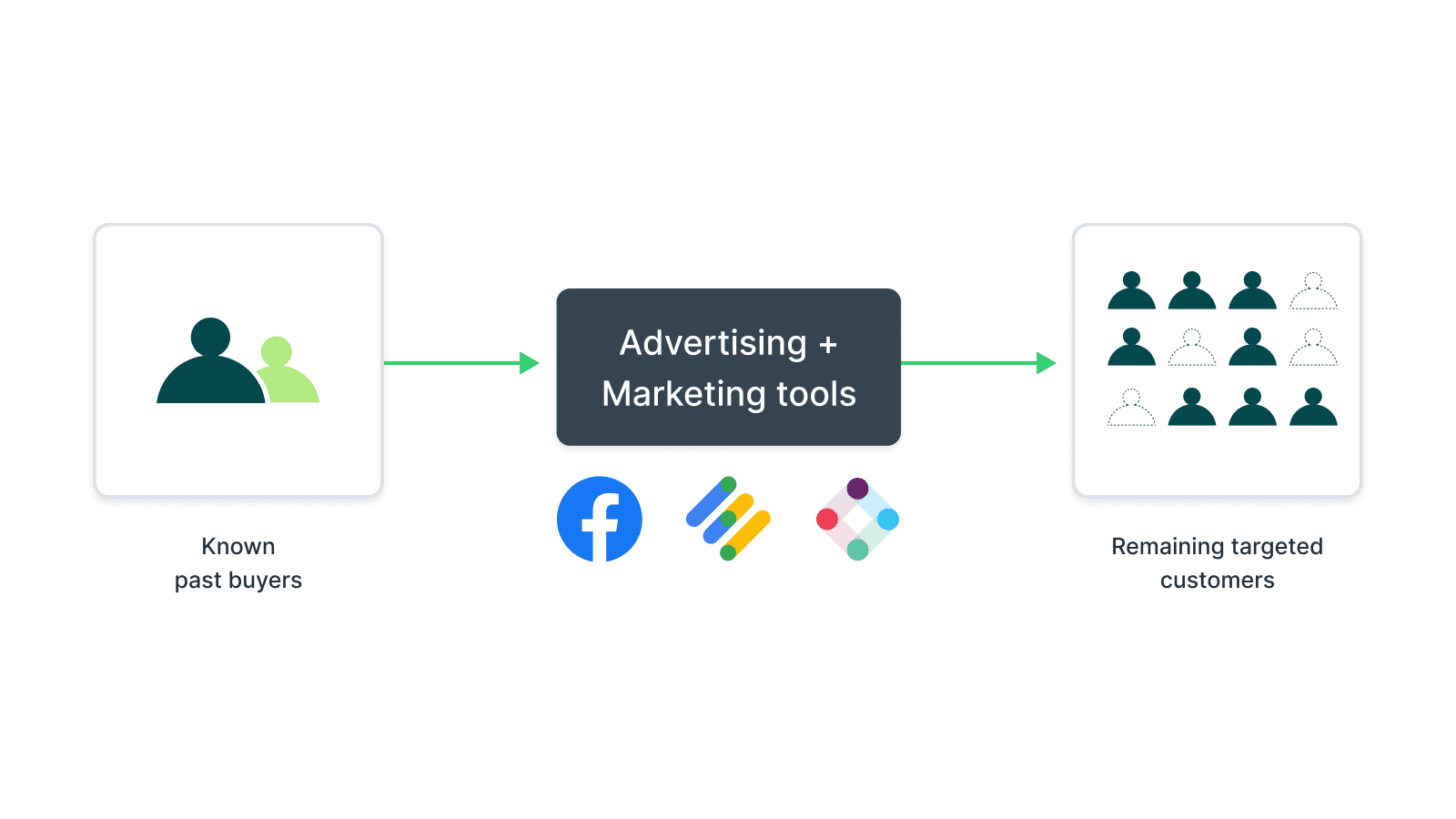
The impact of effective audience suppression goes far beyond cost savings and can substantially increase future revenue. In advertising, through walled gardens like Facebook, you can use your suppression lists to create lookalike audiences that will contain users more likely to complete your conversion activities. In marketing, you'll boost the effectiveness of each campaign, improving reach in social platforms and the likelihood of making it to primary email inboxes. Consequently, you can reach your suppressed customers with more targeted, relevant communications catering to their needs.
Audience suppression is a classic example of the Pareto Principle– 80% of outcomes are driven by just 20% of inputs. It's a relatively straightforward lever to pull that can have an outsize impact on your overall return on ad spend (ROAS) and marketing campaign effectiveness.
Additionally, audience suppression addresses the limitations many walled garden conversion upload processes pose. While platforms like Google can track conversions they drive, enabling you to optimize campaigns and reduce the need to suppress those specific customers, they only have visibility into conversions directly driven by their platform. If a customer purchases from your site after visiting Facebook, Facebook may know about it, but Google does not. If you aim to ensure all of your ad platforms avoid customers who have already purchased or suppress users based on other attributes, such as activity they took in-person at your company's store, syncing suppression lists becomes the only scalable solution.
These benefits are all fairly obvious. However, in practice, only some companies are practicing audience suppression at scale.
Why Suppression Audiences are Underutilized
In reality, there's a massive gap between a company's knowledge of a customer's actions and the ability to quickly, consistently act on that data. At many companies, customer actions in places like the website, email platforms, and actual transactions are stored in disparate locations– none of which are readily accessible to marketers, advertisers, and the platforms they use daily. Data-mature companies may have implemented a centralized data warehouse or lakehouse to consolidate customer information, but this central store often remains disconnected from adtech and martech platforms.
More often than not, suppression is handled as an ad-hoc problem, with business users requesting lists of purchasers from the data team, receiving CSV files, and manually uploading the audiences to their various platforms for suppression. This process is slow, manual, and, worst of all– too infrequently done to be effective. Audiences quickly become outdated, failing to reflect more recent customer actions. If you're uploading a suppression list once a week to target your advertising campaign, you're compounding costs over seven days on customers you should not be targeting.
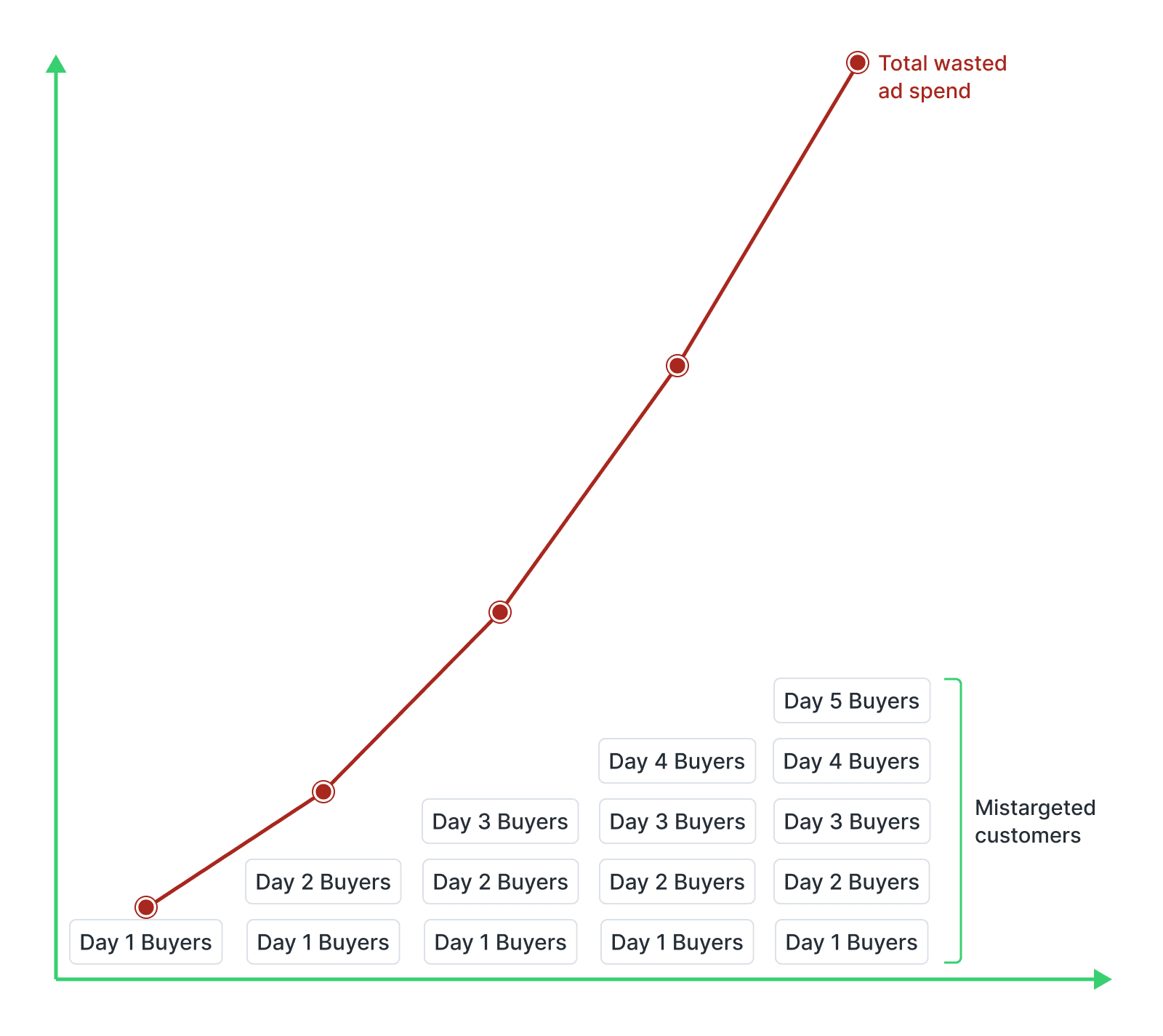
Furthermore, an effective marketer or advertiser should build dozens of suppression lists based on different criteria, aiming to exclude specific customers from each type of campaign. These custom lists may also depend on user actions that your company measures and stores in different places, such as combinations of in-person and digital interactions. The manual processes that suppression lists require today mean that these lists are not utilized at all on most campaigns where they should be and stale on the few where they are applied.
Solving the Suppression Problem
For data to add maximum value to a company, it must be put to work in all downstream platforms that marketers and advertisers use. Business users must be able to define and evaluate new suppression audiences quickly without writing code or SQL and stream those audiences directly into the platforms where they run their campaigns.
To address these needs, companies turn to Hightouch, a Data Activation platform designed to empower marketers and advertisers to curate and analyze audiences directly from their data warehouse or any other data storage system within their organization before delivering them seamlessly to all their relevant tools.
With Hightouch, business and marketing teams can quickly define and build as many suppression audiences as needed. They can create suppression lists directly from their data warehouse, utilizing audience data that spans digital and in-person interactions. Once set up, they never have to think about these audiences again–Hightouch ensures freshness and accuracy across all your marketing and advertising tools. If you want to start today, we've written a step-by-step playbook for suppressing an audience from Facebook.
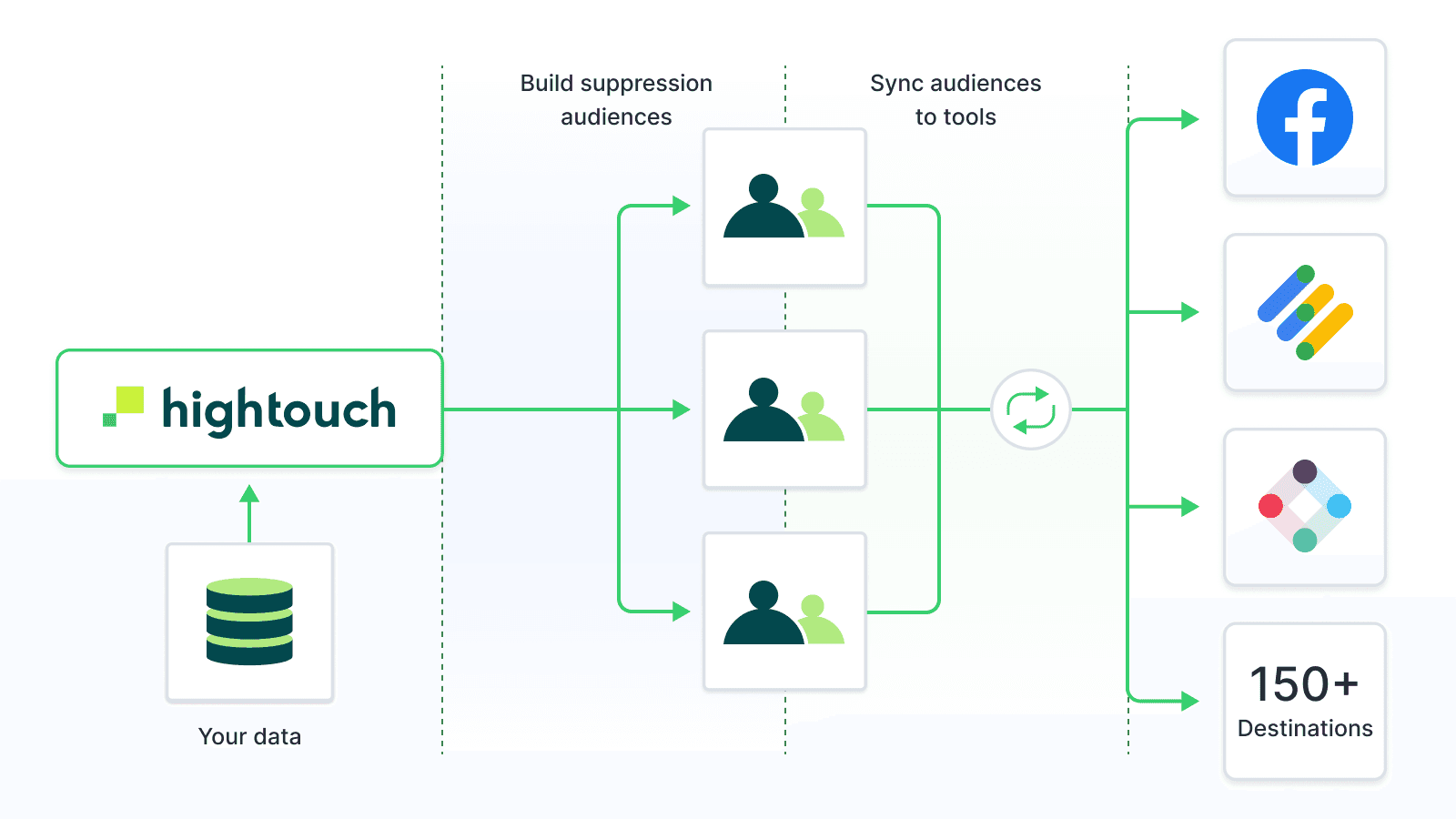
Advertisers can now further increase the effectiveness of their audiences synced to platforms like Google Ad Manager by utilizing Match Booster. We'll enrich your customer data as it syncs to these platforms with our proprietary database to fill in missing customer identifiers, boost match rates, and ensure your audience is as large and accurate as possible.
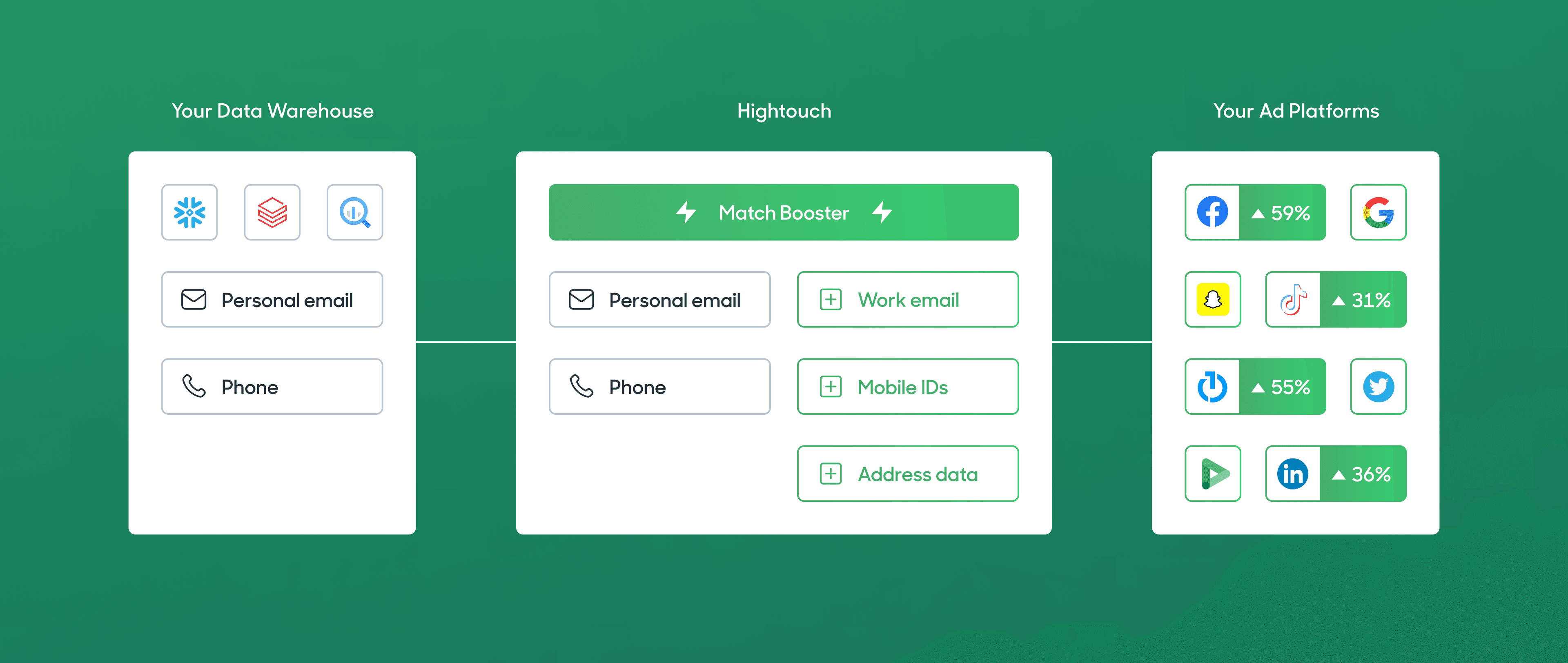
Getting Started
Customers set up their first sync with Hightouch on average in just 23 minutes. For less than the time it would take you today to reach out to your engineering team for an audience and then upload that audience a single time into your downstream platforms, you can solve suppression on your own into perpetuity.
Reach out to us for a demo today, set up a workspace now to try it out, or join our webinar on May 31, 2023 for a hands-on session.
The Ultimate Guide to Paid Media Integrations
Read our whitepaper and learn why conversion APIs are replacing 3rd-party cookies.
- The death of third-party cookies
- Leveraging conversion signals to boost ROAS
- Sending conversions events to ad platforms





